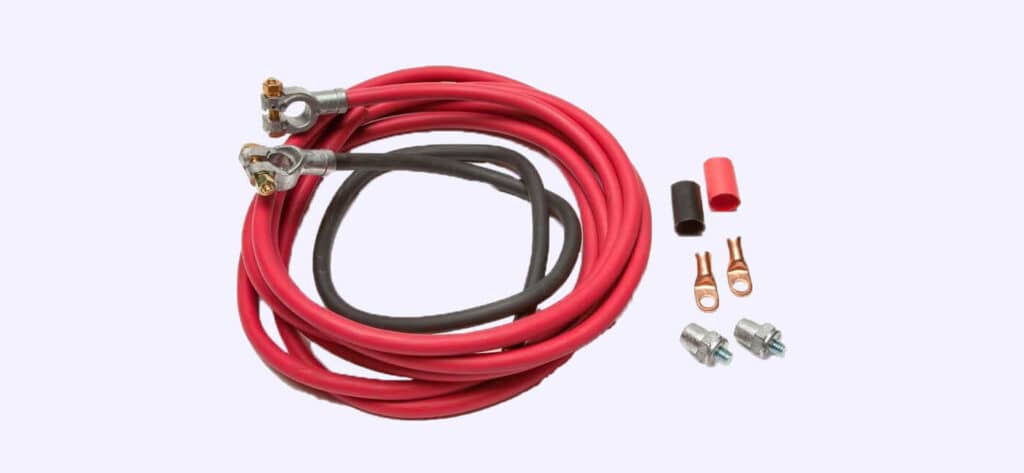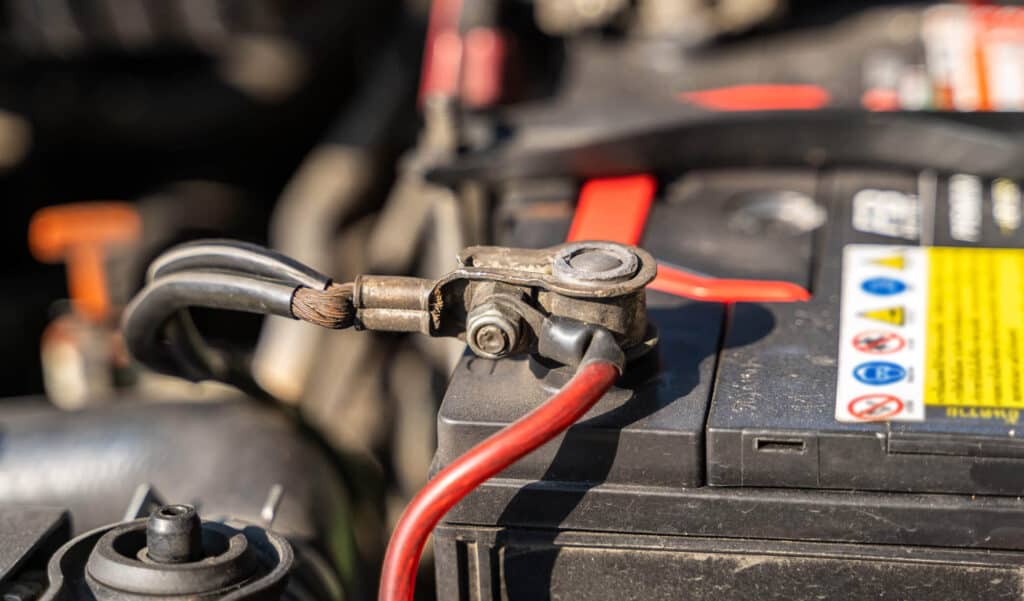Introduction: “Understanding Battery Cables: The Vital Connection in Your Vehicle’s Electrical System”
Battery cables are the lifelines of your vehicle’s electrical system, connecting the battery to the engine and other electrical components. Without them, your vehicle’s battery would be a powerhouse without any outlets to send energy to.
Recognizing the Signs: How Do You Know if Your Battery Cable is Bad?
• Difficulty Starting the Vehicle: If the car doesn’t start smoothly or takes several attempts, this could be a sign that the battery cable is damaged or corroded, hindering the electrical connection.
• Flickering Lights: Unusual behavior in the vehicle’s lighting system, such as flickering or dimming lights, might indicate that the battery cables are not transmitting power properly.
• Electrical Malfunctions: If other electrical systems in the car (e.g., radio, power windows) are behaving erratically, this may be due to bad battery cables.
• Visible Wear and Tear: Inspecting the cables for visible signs of damage, fraying, or corrosion can give direct evidence of a bad battery cable. Regular checks for these signs can help in early detection.
• Smell of Burning or Rotten Eggs: A burning smell or the scent of rotten eggs could signal a leaking battery, affecting the cables.
• Check Engine Light: Sometimes, the car’s check engine light might come on if there’s a problem with the battery or its connections, including the cables.
• Regular Inspections: Routine inspections by professionals or even a vigilant car owner can catch signs of wear and tear early, allowing for timely repair or replacement before the issues escalate into major problems.

Understanding and recognizing these signs can save you from unexpected breakdowns and costly repairs, ensuring a smooth driving experience. If any of these signs are present, considering professional assistance from a mobile mechanic company might be a wise decision.
Fighting Corrosion: Causes, Prevention, and Solutions for Battery Cable Decay
Corrosion is a common problem for battery cables, and understanding the causes is key to prevention. It can happen faster than you think, especially in environments with high humidity or exposure to road salt. When moisture combines with the sulfate compounds in the battery, it leads to corrosive build-up. This nasty invader can eat away at the cable’s integrity, weakening the connection and reducing its efficiency. Applying a corrosion preventative spray or using grease can ward off this decay, acting as a shield against the elements.
Commercial cleaners specifically designed to fight battery corrosion are available, or you can opt for a home remedy of baking soda and water. By carefully cleaning the terminals with a wire brush and applying the solution, you can remove corrosion and restore your cables to tip-top shape. Regular checks and cleaning can ensure that corrosion doesn’t sneak up on you, keeping your vehicle’s electrical system running smoothly.
Battery Terminal Maintenance: When and How to Replace, and Tips for Protection Against Corrosion
Battery terminals are like the gatekeepers of your vehicle’s electrical system, and proper maintenance is essential. The time to consider replacement is when you see excessive corrosion, physical damage, or experience difficulty starting the vehicle. Regular inspection can help you catch these issues early, and replacement can often be a simple task. Professional mechanics can handle it quickly, or if you’re comfortable, a DIY replacement might be an option, using specialized tools.
Of course, prevention is better than cure. Anti-corrosion sprays are available that can create a protective layer over the terminals. Using protective washers or even a thin layer of petroleum jelly can also help in preserving the cables from corrosion. Regular maintenance, coupled with these preventative measures, can extend the life of your battery terminals and cables, ensuring a smooth and uninterrupted flow of power to your vehicle’s vital systems. Trusting experts for regular inspections can help maintain this vital part of your vehicle in pristine condition.
Costs and DIY Options: An Analysis of Battery Cable Replacement and Repair Expenses
Cost of Professional Replacement
• Average Cost: Typically ranges from $50 to $200.
• Factors Influencing Cost: Complexity of the job, make and model of the vehicle, location of the battery, and labor costs in your region.
• Inclusion of Parts: Costs may or may not include the price of the replacement cable, so it’s good to confirm this with the service provider.
DIY Replacement Options
• Feasibility: Yes, a DIY replacement is possible if you have basic mechanical skills.
• Tools Required: Wrenches, wire brushes, battery terminal puller, and protective gloves and eyewear.
• Potential Savings: Performing the replacement yourself can save on labor costs, potentially cutting the expense in half.
• Access to Instructions: Various online tutorials and vehicle manuals can guide you through the process.
• Warnings and Precautions: Proper safety measures must be observed, including disconnecting the battery in the correct order to avoid injury or damage.
Considerations for Repair vs. Replacement
• Assessing the Damage: A minor issue might only require a repair, such as cleaning corrosion, while a more damaged cable likely needs a full replacement.
• Cost of Repair Kits: If a repair is feasible, kits are available at auto parts stores, often for under $20.
Professional Support and Mobile Options
• Consulting a Mechanic: If unsure about the DIY approach, professional mechanics, like Uchaincs, can provide expert support.
• Mobile Mechanic Services: Some companies offer mobile services, adding convenience but possibly affecting the overall cost.
Understanding these various aspects allows for informed decision-making when faced with battery cable replacement or repair, ensuring that you choose the best option for your situation and budget.
Lifetime Expectations: How Often Should Battery Cables Be Replaced, and What Factors Influence Their Lifespan?
How often should battery cables be replaced? It’s a common question for car owners, and the answer is typically every 50,000 to 100,000 km. However, this is not a hard rule, as several factors can influence the lifespan of a battery cable. The type of vehicle, the driving conditions (such as extreme temperatures), quality of the cable, and even the manner in which the car is driven can all play a role. Regular inspections can help identify signs of wear and tear before they lead to bigger issues.
While it’s a common belief, corrosion on the battery terminals doesn’t always signal a faulty battery. It could be a symptom of other underlying issues like overcharging, leakage, or the use of incompatible metal parts. Therefore, it’s essential to check the entire system and not just the visible corrosion. A professional evaluation can accurately diagnose the problem and suggest the appropriate solution.

From Prevention to Repair: A Comprehensive Guide to Battery Cable Care and Maintenance
Prevention is the key to prolonging the life of your battery cables. Regular inspections, proper cleaning, and being aware of your vehicle’s specific needs are vital. In some cases, a simple repair using a repair kit is all that’s needed. This might include cleaning corrosion or mending a minor break in the cable. Sometimes, simple home remedies like using baking soda and water can remove corrosion and help maintain the cables’ integrity.
However, regular maintenance goes beyond simple repairs. It includes practices like keeping the battery and its surroundings clean, ensuring that the terminals are tightly fastened, and using protective measures like anti-corrosion sprays. Regular servicing by professional mechanics can provide a thorough assessment and take care of complex maintenance needs. Whether it’s prevention or repair, understanding your vehicle’s needs and acting on them can maximize the life of your battery cables, saving both time and money in the long run.
Conclusion: “Maximizing the Life of Your Battery Cables: A Summary of Best Practices and Essential Knowledge”
Your vehicle’s battery cables are more than just wires; they are vital connectors that keep everything running smoothly. Understanding their lifespan and maintaining them properly ensures a longer-lasting and more reliable vehicle. If you’re seeking expert help with battery cable care or replacement, Uchaincs, a mobile mechanic company in Canada, is your go-to solution for all your automotive needs. Book an appointment today and let Uchaincs take care of the rest!
